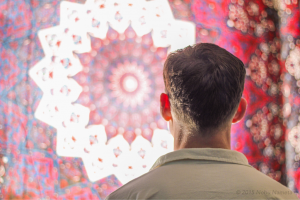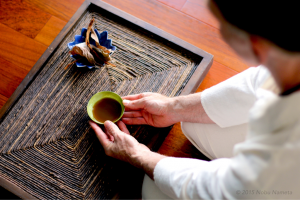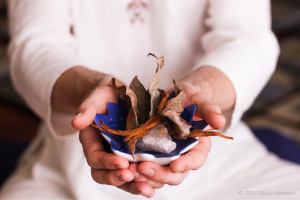In the second part of this two-part interview (read part one here), SevenPonds spoke with Dercas Nidra (his name has been changed to protect his identity). He is a licensed social worker and yoga instructor from San Francisco who leads monthly ayahuasca sessions to help people through grief. Ayahuasca is a tea made from plants that originated with indigenous people in South America. People who drink the tea experience intense visions and other effects through its active ingredient DMT (a psychedelic compound). While the tea is illegal for individual use, Dercas Nidra describes its benefits for psychological healing.
Marissa: You say you use ayahuasca in a group setting. What does this process look like?
Dercas: There’s a weeklong dietary prep that’s essential. It requires some people to wean from certain medications that they’re on with guidance from a doctor. When people gather for the evening, we do a very simple meditation around setting intentions. If people brought items for the altar, we set them there. We’re very non-denominational. It’s a larger group. I usually don’t facilitate more than 12 people at a time, and my smaller groups are three or four people. If there are random strangers, we do our typical icebreakers so people get to know each other. I sometimes lead them into yoga movements because they are going to be sitting still or lying still for a while. Getting them comfortable with their bodies is helpful. We do a community prep. We create a soup for us to share after. It’s a nice community-building experience too. Then when people circle up, they say their intentions. Everyone is really encouraged to go into their own experience.
So even when circles of friends come together, that’s a reminder that it’s like going to a movie. You don’t talk over the movie. You have your experience and talk about it afterward. During the meditation there’s music. After the meditation is done, we’ll share a meal. Most people are usually pretty quiet. Then they sleep. The next morning I ask, and what I think is most important, is now that you’ve had this experience, what is it that you wanna do with that? We go around a couple times in a circle, people talking through it. The experience sticks around, but it’s also easy to forget.
Talking about the stories in the recesses of our minds helps keep it fresh. Then we talk more about what areas of your life you’re going to integrate that into. Is it your relationships? Is it your work? I also try to keep in touch with the participants to help them further that, because it can be a couple weeks before they’re aware of how this awareness is rubbing up against the world. How do I manage that gap, you know?
Marissa: Have you ever done this alone?
Dercas: The people who profess to be “the keepers of the medicine” never recommend that. I would sit with my significant other, or they would sit with me. There’s just a possibility of being in a place where the simplest things like getting to the restroom are difficult. There is a purging that can happen, and sometimes people end up vomiting or having diarrhea. It’s an intense experience, and one might need help. It’s highly recommended to not journey alone.
Marissa: You talk a lot about the benefits of ayahuasca on grief, but have you ever had a negative experience?
Dercas: I feel blessed that the way the medicine works for me is I’ve had some very good experiences. I’ve had some very dark experiences too. I’ve witnessed my own illness, or feeling very old and decrepit. I’ve seen different variations of myself. But I came out of that feeling more empowered in my own health and well-being, knowing it was just a glimpse into mortality. I feel very grateful for those experiences, even though they’re not the interstellar travel, oneness with the world kind. It feels like a very limiting experience, but it’s actually a very human experience. I think that this is something that’s always been part of me. I’ve always been a little bit curious about death and dying, and it’s always been a calling for me. That’s probably why the medicine presents it to me.
As far as other people’s experiences, I have had people get really overwhelmed, or get very anxious. The saying goes that ayahuasca is for everyone, but everyone may not be for ayahuasca. It can be a medicine that can help people, but people need to be ready and prepared for it. Part of the pre-screening is that they have things in place. They have a regular yoga or meditation practice. They go to therapy regularly. They come with their friends who support them afterward. People who have even a difficult time in the experience also get the support that they need. Breathing can get people out of that space of feeling uncomfortable or unpleasant, and get them in a different space.
Marissa: Does your experience as a social worker and yoga instructor help in those instances?
Dercas: I hope so (laughs). There’s 200-some people who have sat with me over the last four years, so my hope is that it’s telling of the skill I offer. It sounds weird to boast and not be humble about it, but I want to be of service, and to be the go-between or introduction that knows what they’re stepping into. They have done the prep work to go deep into their own psyche, and therefore they’re trusting me to hold that space for them. If it gets so difficult for them, we see that that difficulty is part of what you want that experience to be. Most people have that mindset. It doesn’t mean that those who have struggled would jump back in.
Some people are like, “I’ve had enough, I’m good, that’s it” (laughs). Other people get a lot out of doing the work. We had one person who just wailed for over an hour, feeling the suffering of so many kittens and young beings on the planet. He was so in it, and we just hugged. He was exhausted. It’s not necessarily something he’d want to revisit. He came out of it with such an open heart of compassion. If we open up our hearts, we will heal parts of our hearts. He has such a deep, sorrowful spirit. He’s come back again and meditated. He wasn’t sure if he’d revisit that, but he considered that a possibility.
Marissa: Who benefits from this experience, and who do you think should avoid trying it?
Dercas: Mixing the Western psychology that we have with the ancient practice, it seems that people who have physical or family history of manic depression or bipolar should probably avoid it. People who have psychotic breaks or something that hasn’t been well-managed, it wouldn’t be wise for them to step into this work. It does mean that people who have trauma, or anxiety or even panic attacks can go so deep into that experience that they come out of it, especially in an environment where we know that’s part of their work. People that are ready and willing to go into it would probably benefit from it.
I think people hear about it and wanna do one of two things: they lean in and want to know more, or they’re like, no that’s not for me. That’s the first level of trusting whether someone is ready or not ready. There’s further dialogue about that too. I seldom meet people who are skydiving adventure kind of people who want to try it for the sake of trying it. Most people are insight-oriented, have some advanced knowledge of self. The benefits and the risks they step into really respectfully. They’re on an inner journey. They’re trusting themselves, as well as me, as well as the tea.
Marissa: Is ayahuasca different from other hallucinogenic drugs in this respect? Do people who drink it think of it more as a medicine?
Dercas: Yeah, and that’s a great question. I also think that people who are seekers of sorts are the ones who try mushrooms or acid at an outdoor concert. Or they have gone out in a public setting while experimenting with these substances. If they found that a positive experience, can they imagine what it’s like to do it in a relatively quiet place, where it’s an internal journey rather than stimulated by the outside world? I hope that it remains protected even by those who have dabbled in psychedelics and who see it as another place to explore themselves. There’s nothing wrong with going to Coachella and journeying. I think that people are feeling things out. They’re psychonauts rather than astronauts, right? They’re gonna go internal. I think people figure that out and then decide if they want to go deeper or not. A lot of people do some wild and excessive things out on The Playa, and some of them want to do something more internally, or may not.
Marissa: So it depends on the person?
Dercas: Yeah, exactly. I’m also surprised by the number of doctors, mental health providers, the healing professionals of our world, a high percentage of people who try this too. They have some introspection that brings them to want to do this meditation, this healing work.
Marissa: Have you witnessed someone who has overcome grief from drinking ayahuasca?
Dercas: Yeah, yeah. First person that comes to mind is someone who doesn’t even live in the Bay Area. He traveled to do this work. He had a very traumatic childhood growing up. A lot of physical and emotional abuse. He found this work really changed things for him, where in the past he really couldn’t even relate to his relatives. He’s slowly making his way back into his family of origin. He’s invested in his own healing, so this has been timely for him.
There was another person who meditated a few times, and his very first experience he came out of it having not ever gone to either of his parents’ funerals, and not visiting his family of origin for 10 years. He recently said, “I’m gonna go back. I’m gonna visit my parents’ graves. I’m gonna do the work I’ve avoided doing all this time.” Within a couple months he was back in his home country with his family.
I think of people who have left a job after many years because it wasn’t feeding their emotional or psychological or spiritual bodies anymore. I’ve met people who have had a happy experience, who go on with life as usual. There’s a fair amount of people who try it because their friends are trying it, and they don’t get something more out of it. That’s one of the concerns about it being so mainstream. I share my good story, and then people say, “I want that experience!” It just doesn’t work that way (laughs). It’s an interesting dance with this teacher known as the plant medicine, that shows us what we want to see, but maybe it doesn’t show up in the way we wanted it to. It’s almost playful in the way it brings things to our awareness.
Marissa: So you never know what you’ll get out of it.
Dercas: Right. And I don’t know if you know this, but speaking of playfulness, some people refer to ayahuasca as grandmother, and that’s what she is to them.
Marissa: I’ve heard that, yeah. I once read that people hear so many stories about seeing the grandmother or mother figure, that it’s a common thing to see when you drink the tea. They think they’ll see her, so they do.
Dercas: Our minds are really strong aren’t they? (laughs)
Marissa: It’s interesting what our brains do, for sure. How often do you hold group sessions?
Dercas: I’m taking a little summer break, but in general I hold a monthly group, and they’re usually pretty small. A small group of friends. Every so often, I do a large group of 10 or 12. Occasionally I’ll hold socials or integration circles at random times of the year to come together and talk. We get to do our part of raising one another’s consciousness through this modality.
Marissa: What do you want people to know most about ayahuasca?
Dercas: One part of me, the social worker in me, is very much an advocate for this having a legal, social and political commentary edge to it. There should be more research done on this, and more awareness. There are many ways to raise consciousness, and this is a modality of it. As the awareness spreads, people will pick their own way of taking care of themselves. With my rural Pennsylvania family, it’s been a conscious choice to educate them more about it. Even though I know they may never do this, I want them to know how it’s impacted me, and the positive effects it’s had on all of the relationships as a result. I want people to know about it because it’s a precious and sacred experience.

 Is Ayahuasca Right for Everyone? An Interview with Dercas Nidra, Part Two
Is Ayahuasca Right for Everyone? An Interview with Dercas Nidra, Part Two





 “Making Mobiles” by Karolina Merska
“Making Mobiles” by Karolina Merska
 “Hands Up to the Sky” by Michael Franti & Spearhead
“Hands Up to the Sky” by Michael Franti & Spearhead
 Coping With Election Grief
Coping With Election Grief














